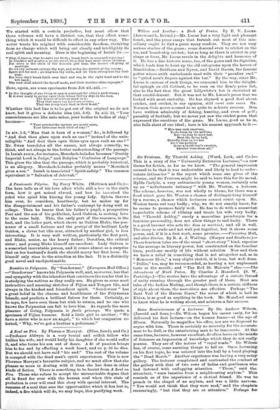Sir Tristram. By Thorold Ashley. (Ward, Lock, and Co.)— This
is a story of the "University Extension Lectures,"—a new theme for fiction, as far as we know. "The general impression seemed to be that it was undesirable and likely to lead to unfor- tunate intimacies" is the report which some one gives of the scheme, and Sir Tristram might be said to have this for its moral_ Hylda Carlyle, a very enthusiastic young woman, certainly sets up an "unfortunate intimacy" with Mr. Weston, a lecturer. The scheme, however, was not wholly to blame, for there was a flood which gave Mr. Weston a chance of distinguishing himself by a rescue, a chance which lecturers cannot count upon. Mr.. Weston turns out very badly ; why, we do not exactly know, for he seems to promise fairly well. He has to do with a somewhat. improbable scheme of villainy and treats his wife very badly. But " Thorold Ashley," surely a masculine pseudonym for a. feminine personality, does not allow things to end badly. There is a good baronet who acts the deus ex machind, and all is well. The story is crude and not well put together, but it shows some power, and, if it is a first work, some promise.—Ftaunting Moll, and other Stories. By R. A. J. Walling. (Harper and Brothers.)— These fourteen tales are of the usual " short-story " kind, superior to the average in literary power, but constructed on the familiar lines, problems mostly of life without solution Now and then we have a relief in something that is not altogether sad, as in "Monsieur Blois," a very slight sketch, it is true, but well done. " Dollie," too, may be recommended, as leaving a not unpleasant taste in the mouth; and "The Red St. Malouin " also.—The' Adventures of Mark Paton. By Charles J. Mansford. (S. W. Partridge.)—The stories have the advantage of a certain thread of unity running through the greater part of them. Most are tales of the Indian Mutiny, and though there is a certain stiffness of style about them, the narratives are effective. Perhaps "The Rent Veil of the Harem Slave," the scene of which is laid in Khiva, is as good as anything in the book. Mr. Mansford seems to know what he is writing about, and achieves a fair success.






































 Previous page
Previous page